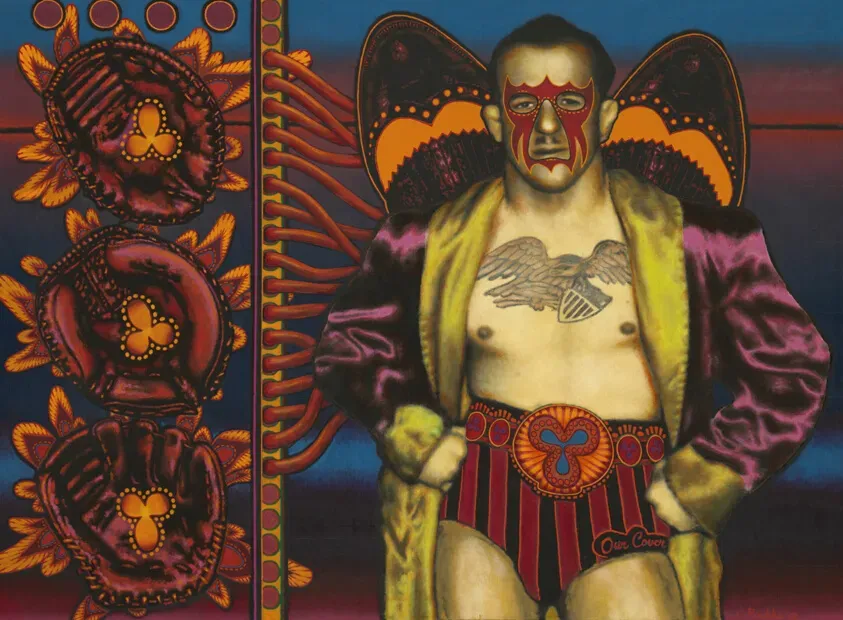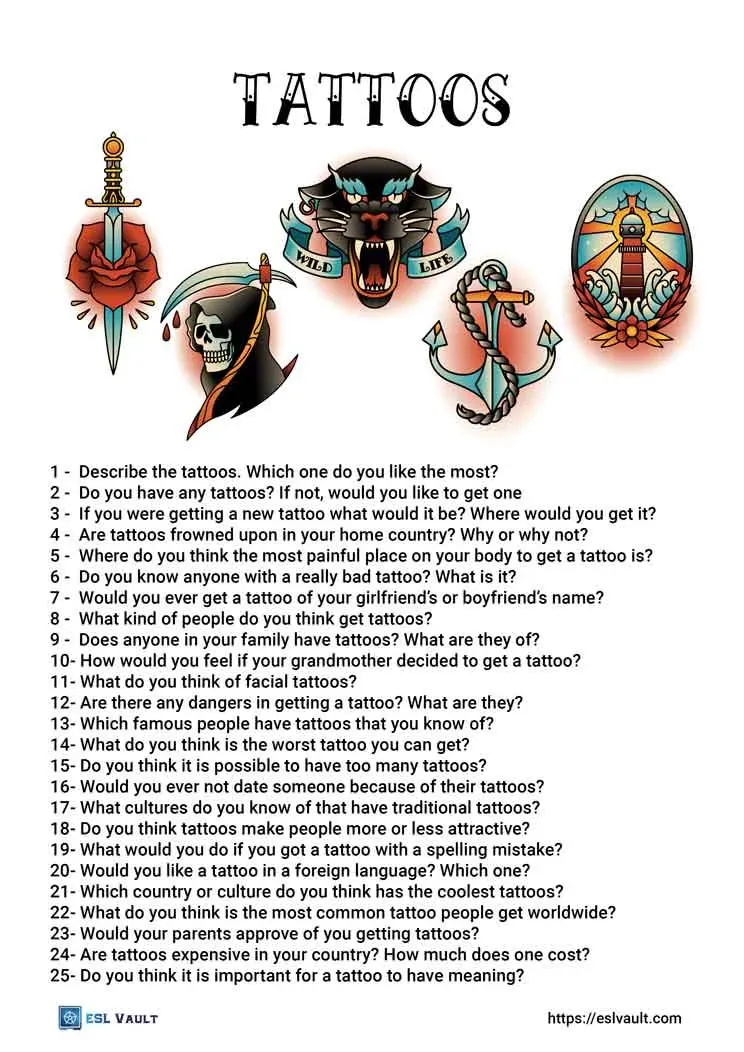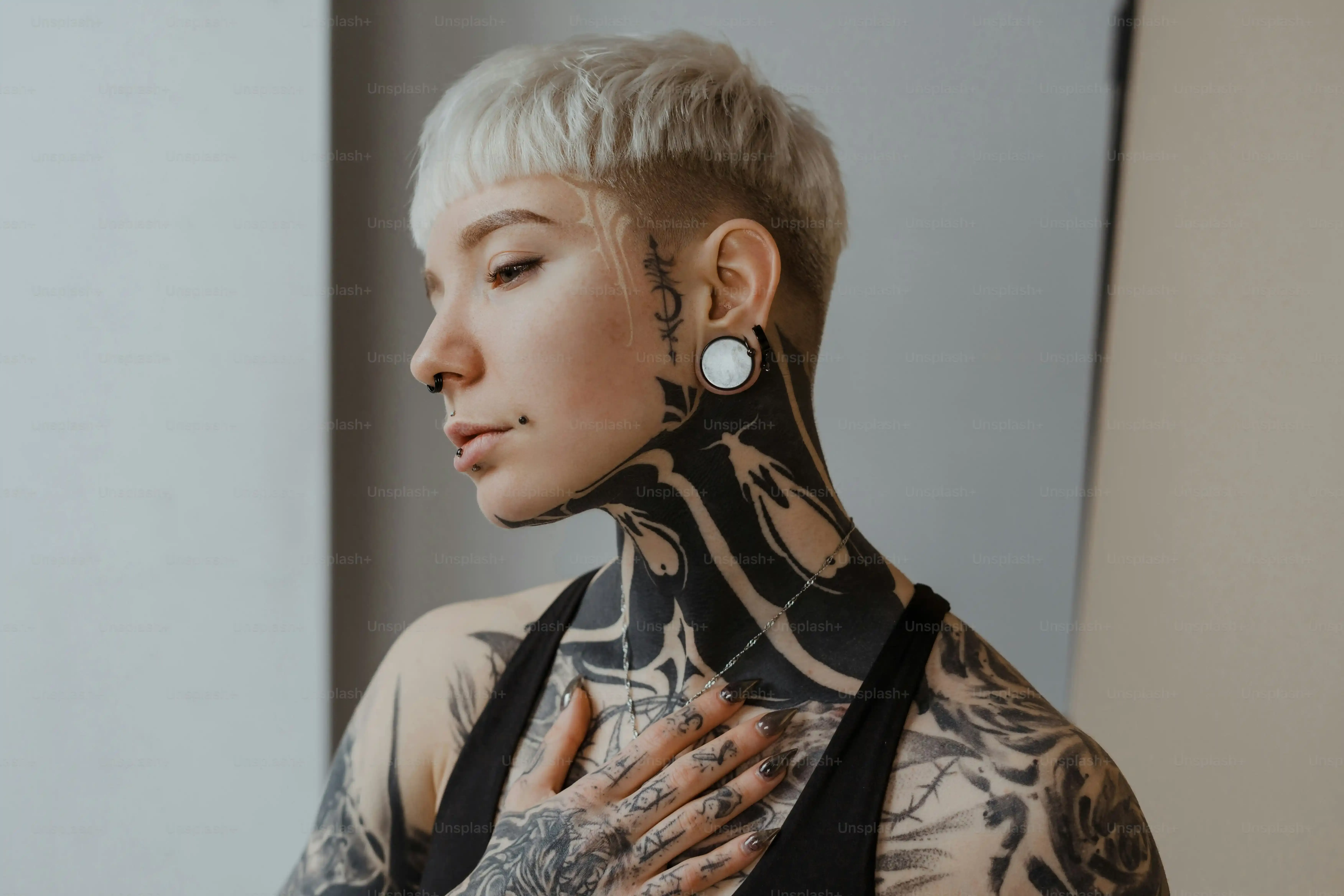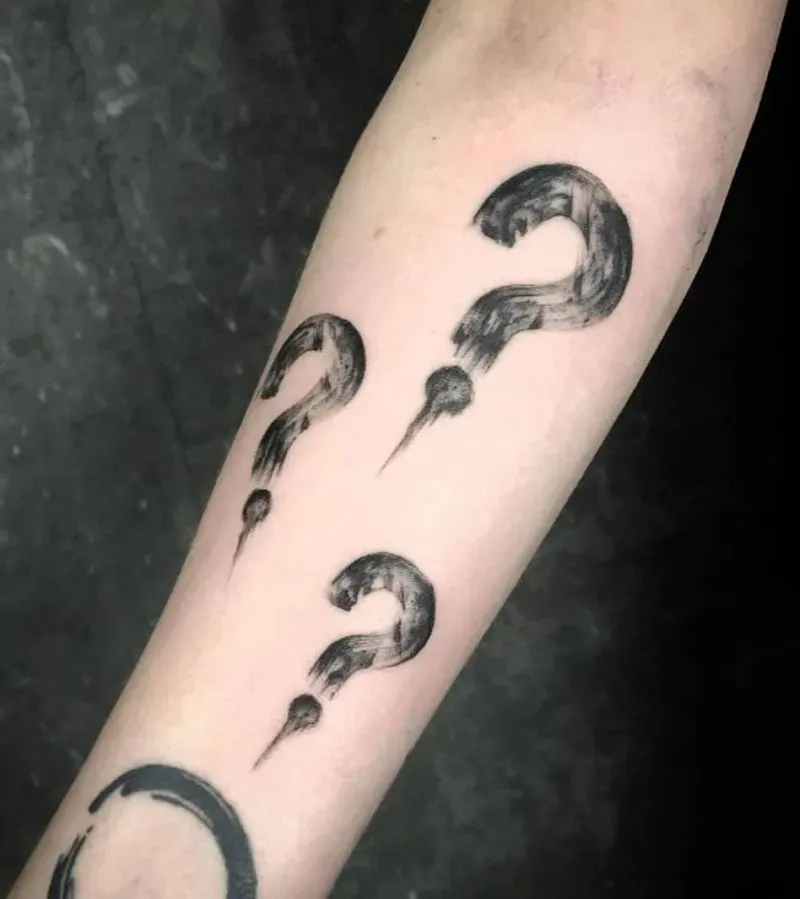Table of Contents
So, you're thinking about getting some ink. Great. Now comes the slightly terrifying part: figuring out exactly *what* to get permanently etched onto your skin. It's not like picking out a new shirt you can just toss if you change your mind. This is a decision loaded with possibilities, and frankly, a few potential pitfalls. Skipping the crucial thinking phase is how you end up with regrettable tribal armbands or misspelled quotes.
Starting Point: Essential Tattoo Design Questions for Yourself
Starting Point: Essential Tattoo Design Questions for Yourself
Why Are You Even Doing This?
Alright, let's cut to the chase. Before you even think about scrolling through endless flash sheets or bothering an artist, you need to sit down and ask yourself: why are you *really* getting a tattoo? Is it a spontaneous whim fueled by cheap beer and a dare? Is it a deeply personal marker of a significant life event? Is it just because your favorite celebrity has one? Understanding your core motivation is the absolute first step in this whole process. Skipping this initial gut-check is like trying to build a house without a foundation. It might look okay for a bit, but eventually, it's going to get wobbly. Be honest with yourself. This isn't about judging your reasons, it's about making sure the outcome aligns with the intent.
What Story Does This Need to Tell?
Tattoos, at their best, are visual narratives. They tell a story about you, your experiences, your beliefs, or the things you hold dear. So, what do you want your skin to say? Are you commemorating a loved one, a journey, a personal triumph, or maybe just something that makes you laugh? Don't just pick a cool image; think about the layers of meaning. A rose isn't just a flower; it can symbolize love, beauty, loss, or resilience depending on its context and your personal connection. This is the heart of the design – the meaning that will anchor it long after the initial sting of the needle fades. This Starting Point: Essential Tattoo Design Questions for Yourself phase is critical for avoiding buyer's remorse later.
Here are some questions to get you thinking about the meaning behind your ink:
- What significant life events have shaped you?
- What symbols or images hold personal significance?
- Are there people or places you want to honor?
- What core values or beliefs do you live by?
What Vibe Are You Going For?
Beyond the meaning, there's the aesthetic. Do you love the clean lines of geometric designs, the bold saturation of traditional American tattoos, the delicate detail of fine line work, or the chaotic energy of abstract art? Think about your personal style, the art you like, the movies you watch, even the way you decorate your home. Your tattoo should feel like an extension of you. Don't try to force yourself into a style just because it's popular right now. Trends fade, but that tattoo is sticking around. Consider if you prefer black and grey or color, realistic or stylized, intricate or simple. These aesthetic tattoo design questions are just as important as the meaningful ones.
Talking to the Pros: Key Tattoo Design Questions for Your Artist
Talking to the Pros: Key Tattoo Design Questions for Your Artist
Finding Your Match: Are They the Right Fit?
you've done the soul-searching part and have a decent idea of what you want and why. Now it's time to vet the person who's going to make it happen. This isn't just about finding someone with an open slot next Tuesday. You need to ask the right tattoo design questions to see if their style, experience, and overall vibe match what you're looking for. Don't be shy about asking to see their portfolio – and look closely. Does their line work look solid? Are their colors packed evenly? Do they have experience with the specific style you're interested in, whether it's fine line, traditional, realism, or something else entirely? A great artist might be amazing at black and grey realism but completely miss the mark on a bright, illustrative piece.
Getting Down to Brass Tacks: Design Details and Practicalities
Once you've found an artist whose work makes you excited, it's time to talk specifics. This is where you hammer out the details of your vision and get clear on the practical stuff. Ask them how they approach the design process – do they draw it up themselves, do they work with your sketches, how many revisions are typical? Crucially, discuss the placement. How will the design wrap around your body? Will it distort over time? These are important tattoo design questions that affect the final look and longevity. And yes, you absolutely need to talk money. Get an estimate, understand their pricing structure (hourly or by the piece), and ask about deposit requirements. Don't forget to ask about aftercare instructions; a beautiful tattoo can be ruined by poor healing.
Essential Tattoo Design Questions for Your Artist:
- What is your experience with this specific style of tattoo?
- Can I see examples of your healed work?
- How do you typically approach designing a custom piece?
- What are the potential challenges with this design on this placement?
- What is your estimated cost and payment process?
- What are your aftercare instructions?
Placement and Size: Answering Practical Tattoo Design Questions
Placement and Size: Answering Practical Tattoo Design Questions
Where on Earth Does This Go? And How Big?
you've got a handle on the 'why' and the 'what,' and you've found an artist who doesn't make you nervous. Now for the nuts and bolts: where does this thing live on your body, and how much real estate is it going to take up? These are major practical tattoo design questions. A delicate script on your wrist is a different beast than a full back piece. Think about visibility – do you want to show it off constantly, or keep it hidden for the most part? Consider how the design will flow with the muscles and curves of that specific body part. A design that looks killer flat on paper might warp weirdly on a knee or elbow. Size also matters; intricate details require space. Trying to cram a sprawling landscape into a postage stamp-sized area is a recipe for a muddy mess down the line. Your artist can offer crucial advice here, but come prepared with an idea of your comfort level for pain (some spots hurt way more than others) and how much of your skin you're willing to commit.
Style and Color: Navigating Aesthetic Tattoo Design Questions
Style and Color: Navigating Aesthetic Tattoo Design Questions
Finding Your Visual Language: What Does Your Style Say?
so you know *why* you want the tattoo and roughly *what* story it should tell. Now, let's talk about how it's going to *look*. This is where the aesthetic tattoo design questions really come into play. Are you drawn to the bold outlines and limited color palettes of traditional American or Japanese styles? Or maybe the intricate dot work and geometric patterns of blackwork? Perhaps the smooth shading and lifelike detail of realism is more your speed, or the whimsical, illustrative feel of neotraditional. Each style has its own rules, its own history, and requires a specific skill set from the artist. Don't feel pressured to fit neatly into one box, but understanding the basic styles helps you communicate your vision to your artist and find someone who specializes in that look. Look at a ton of tattoos, figure out what makes your eyes happy, and pay attention to the styles that keep popping up in your saved folders.
The Color Conundrum: Black and Grey or Full Spectrum?
One of the biggest aesthetic tattoo design questions is the color decision. Black and grey tattoos have a classic, timeless quality. They often age incredibly well, and the shading can create stunning depth and texture. Think portraits, dark imagery, or realistic nature scenes. On the other hand, color tattoos pop. They can be vibrant, playful, or incredibly striking. Bright pigments can capture the energy of a subject in a way black and grey can't. However, color requires different techniques, can fade differently depending on placement and sun exposure, and might need touch-ups down the line. Your skin tone also plays a role here; some colors show up better on certain complexions than others. Discuss this with your artist; they can advise on what will look best and last longest on your skin.
Consider these points when deciding on color:
- Do you want the tattoo to be subtle or a statement piece?
- How will the colors potentially fade over time?
- Does your skin tone handle certain pigments well?
- Does the chosen style traditionally use color or black and grey?
- Are you prepared for potential touch-ups on vibrant colors?
Pulling Inspiration: How to Refine Your Vision
Finding inspiration isn't just about picking a picture off the internet. It's about gathering elements that resonate with you and figuring out how they fit together. Maybe you love the texture of a specific painting, the line quality of a certain illustrator, the color palette of a photograph, or the symbolism of an object. Collect images, textures, and ideas that speak to you. This collection becomes your visual brief for the artist. Don't expect them to copy something exactly (good artists won't), but use these references to show them the *feeling* and *aesthetic* you're aiming for. Be open to their interpretation and suggestions; they are the experts in translating ideas into ink. This collaborative process is key to answering your specific tattoo design questions about look and feel.
The Long Haul: Commitment and Future Tattoo Design Questions
The Long Haul: Commitment and Future Tattoo Design Questions
Thinking Beyond Tomorrow: How Will You Feel in 10, 20, 50 Years?
you love the design now. It speaks to you, it's perfectly placed, and your artist is a genius. But let's get real for a second. This ink is a lifetime commitment. People change. Styles change. Your body changes. One of the most critical tattoo design questions you need to grapple with is how you think you'll feel about this particular piece down the road. Will that inside joke still be funny in twenty years? Will that symbol still hold the same weight after major life shifts? It's impossible to predict the future perfectly, but spending some time contemplating the long-term implications is just smart. This isn't about being negative, it's about being pragmatic. A timeless design, or one that can be integrated into future work, often holds up better than something hyper-specific to a fleeting moment.
- Will your career path be impacted by visible tattoos?
- How might your personal style evolve?
- Are you prepared for potential fading and the need for touch-ups?
- Could the meaning behind the tattoo shift significantly over time?
Planning for the Future: Placement, Cover-ups, and Additions
Considering the long haul also means thinking about how this tattoo fits into the bigger picture of your body art journey, if you plan to have one. If this is your first piece, do you envision getting more? If so, where might they go, and how could this current design complement or conflict with future additions? These are practical tattoo design questions that artists often consider. Sometimes, placing a piece with future expansion in mind can make subsequent work easier and more cohesive. Conversely, getting a massive, intricate piece in a prime location might limit your options later if you have a change of heart or want to cover it up. Discussing the possibility of future cover-ups or additions with your artist isn't admitting doubt; it's just acknowledging the permanence of the medium and planning ahead like a responsible adult.
Making Your Mark: Final Thoughts on Tattoo Design Questions
So there you have it. Getting a tattoo isn't brain surgery, but it's also not buying a coffee – the stakes are a bit higher. Running through these tattoo design questions, both for yourself and with your chosen artist, isn't just busywork. It’s the difference between walking out with a piece of art you love for decades and ending up with something you constantly try to hide. Take the time, do the research, and ask the hard questions. Your future self (and your skin) will thank you.